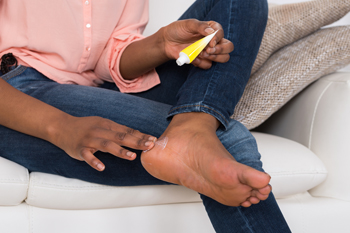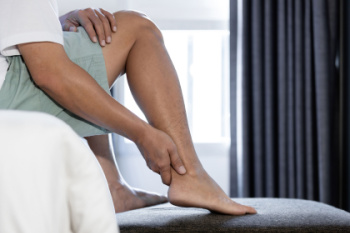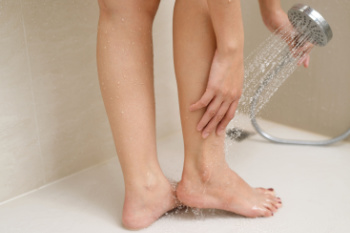 Cracked and dry heels can be a bothersome and sometimes painful issue that many people face. There are several common causes behind this condition, including dry skin, lack of moisture, or standing for long periods. Wearing open-back shoes and specific medical conditions, such as diabetes or thyroid disease, can also contribute. People who have atopic dermatitis, psoriasis, and other skin issues may have a higher likelihood of developing cracked heels. When the skin on the heels becomes excessively dry, it loses its elasticity and may crack under pressure, leading to discomfort and potential complications if left untreated. Additionally, certain lifestyle factors, like inadequate hydration or poor foot care practices, can make the problem worse. Podiatrists, or foot doctors, can offer treatments, such as moisturizing creams, exfoliation, or custom orthotics, to provide relief and promote healing. If you are struggling with cracked or dry heels, it is suggested that you consult a podiatrist for help.
Cracked and dry heels can be a bothersome and sometimes painful issue that many people face. There are several common causes behind this condition, including dry skin, lack of moisture, or standing for long periods. Wearing open-back shoes and specific medical conditions, such as diabetes or thyroid disease, can also contribute. People who have atopic dermatitis, psoriasis, and other skin issues may have a higher likelihood of developing cracked heels. When the skin on the heels becomes excessively dry, it loses its elasticity and may crack under pressure, leading to discomfort and potential complications if left untreated. Additionally, certain lifestyle factors, like inadequate hydration or poor foot care practices, can make the problem worse. Podiatrists, or foot doctors, can offer treatments, such as moisturizing creams, exfoliation, or custom orthotics, to provide relief and promote healing. If you are struggling with cracked or dry heels, it is suggested that you consult a podiatrist for help.
Cracked heels are unsightly and can cause further damage to your shoes and feet. If you have any concerns, contact one of our podiatrists from Family Foot Health Center. Our doctors can provide the care you need to keep you pain-free and on your feet.
Cracked Heels
Cracked heels appear unappealing and can make it harder for you walk around in sandals. Aside from looking unpleasant, cracked heels can also tear stockings, socks, and wear out your shoes. There are several methods to help restore a cracked heel and prevent further damage.
How Do You Get Them?
Dry skin is the number one culprit in creating cracked heels. Many athletes, walkers, joggers, and even swimmers suffer from cracked heels. Age and skin oil production play a role to getting cracked heels as well.
Promote Healing
Over the counter medicines can help, especially for those that need instant relief or who suffer from chronic dry feet.
Wear Socks – Wearing socks with medicated creams helps lock in moisture.
Moisturizers – Applying both day and night will help alleviate dryness which causes cracking.
Pumice Stones – These exfoliate and remove dead skin, which allows for smoother moisturizer application and better absorption into the skin.
Change in Diet
Eating healthy with a well-balanced diet will give the skin a fresh and radiant look. Your body responds to the kinds of food you ingest. Omega-3 fatty acids and zinc supplements can also revitalize skin tissue.
Most importantly, seek professional help if unsure how to proceed in treating cracked heels. A podiatrist will help you with any questions or information needed.
If you have any questions, please feel free to contact our office located in Rogers and Berryville, AR . We offer the newest diagnostic and treatment technologies for all your foot care needs.

Achilles tendon injuries encompass various conditions affecting the Achilles tendon, the large tendon connecting the calf muscles to the heel bone. Tendonitis involves inflammation of the tendon due to overuse or repetitive stress, causing pain and swelling along the back of the lower leg or above the heel. Tendinosis refers to chronic degeneration of the Achilles tendon, often resulting from untreated or recurrent tendonitis. This condition may manifest as persistent pain and stiffness in the affected area. Paratenonitis affects the outer layer of the tendon, causing pain and swelling around the tendon rather than within it. Insertional Achilles tendinitis occurs at the point where the tendon inserts into the heel bone, leading to pain, swelling, and sometimes the formation of a bony bump. Treatment may involve rest, anti-inflammatory medications, custom-made orthotic devices, and in severe cases, surgical intervention to repair or remove damaged tissue. If you suffer from Achilles pain, it is suggested that you schedule an appointment with a podiatrist for a treatment plan tailored to your condition and the severity of the injury.
Achilles tendon injuries need immediate attention to avoid future complications. If you have any concerns, contact one of our podiatrists of Family Foot Health Center. Our doctors can provide the care you need to keep you pain-free and on your feet.
What Is the Achilles Tendon?
The Achilles tendon is a tendon that connects the lower leg muscles and calf to the heel of the foot. It is the strongest tendon in the human body and is essential for making movement possible. Because this tendon is such an integral part of the body, any injuries to it can create immense difficulties and should immediately be presented to a doctor.
What Are the Symptoms of an Achilles Tendon Injury?
There are various types of injuries that can affect the Achilles tendon. The two most common injuries are Achilles tendinitis and ruptures of the tendon.
Achilles Tendinitis Symptoms
- Inflammation
- Dull to severe pain
- Increased blood flow to the tendon
- Thickening of the tendon
Rupture Symptoms
- Extreme pain and swelling in the foot
- Total immobility
Treatment and Prevention
Achilles tendon injuries are diagnosed by a thorough physical evaluation, which can include an MRI. Treatment involves rest, physical therapy, and in some cases, surgery. However, various preventative measures can be taken to avoid these injuries, such as:
- Thorough stretching of the tendon before and after exercise
- Strengthening exercises like calf raises, squats, leg curls, leg extensions, leg raises, lunges, and leg presses
If you have any questions please feel free to contact our office located in Rogers and Berryville, AR . We offer the newest diagnostic tools and technology to treat your foot and ankle needs.
 Good foot hygiene is an important part of overall health and involves several key practices. Daily foot care should include washing your feet with soap and water to remove dirt and bacteria, and thoroughly drying them afterward to prevent fungal infections. Applying moisturizer can help keep the skin from becoming dry and cracked. Nails should be trimmed straight across and not too short to avoid ingrown toenails and infections. A daily inspection of your feet for any cuts, blisters, redness, or swelling can help to catch potential problems early, especially for those with diabetes or circulation issues. It is also important to keep your shoes clean on the inside and outside. Regular check-ups with a podiatrist, or foot doctor, enhance these daily practices by providing professional assessment and treatment of any foot issues. Podiatrists can offer advice tailored to your specific foot health needs and create plans to maintain overall foot wellness. To help support your foot health and overall quality of life, make an appointment with a podiatrist today.
Good foot hygiene is an important part of overall health and involves several key practices. Daily foot care should include washing your feet with soap and water to remove dirt and bacteria, and thoroughly drying them afterward to prevent fungal infections. Applying moisturizer can help keep the skin from becoming dry and cracked. Nails should be trimmed straight across and not too short to avoid ingrown toenails and infections. A daily inspection of your feet for any cuts, blisters, redness, or swelling can help to catch potential problems early, especially for those with diabetes or circulation issues. It is also important to keep your shoes clean on the inside and outside. Regular check-ups with a podiatrist, or foot doctor, enhance these daily practices by providing professional assessment and treatment of any foot issues. Podiatrists can offer advice tailored to your specific foot health needs and create plans to maintain overall foot wellness. To help support your foot health and overall quality of life, make an appointment with a podiatrist today.
Everyday foot care is very important to prevent infection and other foot ailments. If you need your feet checked, contact one of our podiatrists from Family Foot Health Center. Our doctors can provide the care you need to keep you pain-free and on your feet.
Everyday Foot Care
Often, people take care of their bodies, face and hair more so than they do for their feet. But the feet are a very important aspect of our bodies, and one that we should pay more attention to. Without our feet, we would not be able to perform most daily tasks.
It is best to check your feet regularly to make sure there are no new bruises or cuts that you may not have noticed before. For dry feet, moisturizer can easily be a remedy and can be applied as often as necessary to the affected areas. Wearing shoes that fit well can also help you maintain good foot health, as well as making it easier to walk and do daily activities without the stress or pain of ill-fitting shoes, high heels, or even flip flops. Wearing clean socks with closed shoes is important to ensure that sweat and bacteria do not accumulate within the shoe. Clean socks help to prevent Athlete’s foot, fungi problems, bad odors, and can absorb sweat.
If you have any questions please feel free to contact our office located in Rogers and Berryville, AR . We offer the newest diagnostic and treatment technologies for all your foot and ankle needs.

